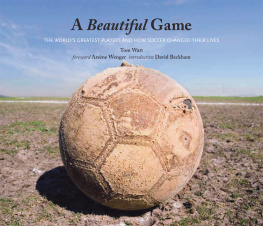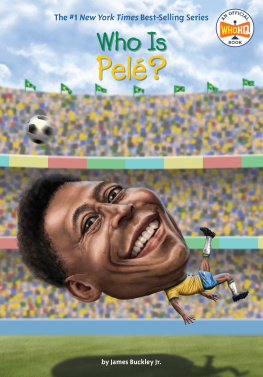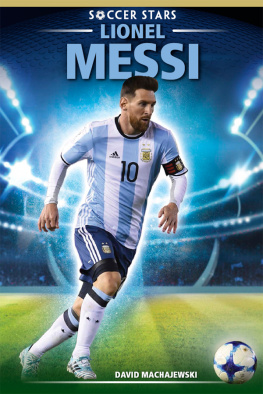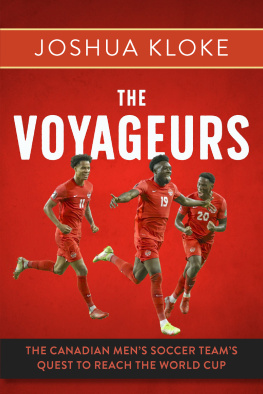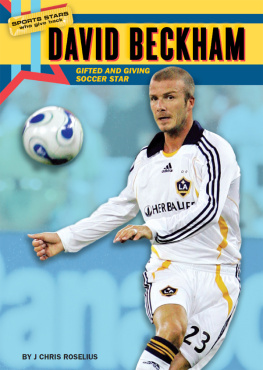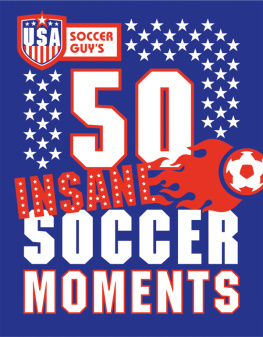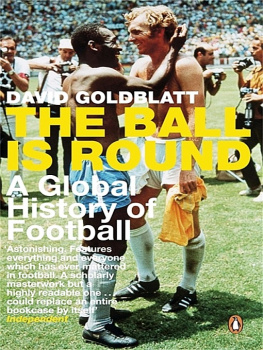

Other books in the
Zonderkidz Biography Series
The Admiral: The David Robinson Story
Beyond the Music: The Bono Story
Defender of Faith: The Mike Fisher Story
Driven by Faith: The Trevor Bayne Story
Gift of Peace: The Jimmy Carter Story
Gifted Hands: The Ben Carson Story
Heart of a Champion: The Dominique Dawes Story
Prophet with Honor: The Billy Graham Story
Reaching New Heights: The Kelly Clark Story
Speed to Glory: The Cullen Jones Story
Toward the Goal: The Kak Story
ZONDERKIDZ
Defending the Line
Copyright 2014 by Alex Carpenter
Requests for information should be addressed to:
Zonderkidz, 3900 Sparks Drive SE, Grand Rapids, Michigan 49546
ePub Edition March 2014: ISBN 978-0310-74607-2
All Scripture quotations, unless otherwise indicated, are taken from The Holy Bible, New International Version, NIV. Copyright 1973, 1978, 1984, 2011 by Biblica, Inc. Used by permission. All rights reserved worldwide.
Any Internet addresses (websites, blogs, etc.) and telephone numbers in this book are offered as a resource. They are not intended in any way to be or imply an endorsement by Zondervan, nor does Zondervan vouch for the content of these sites and numbers for the life of this book.
All rights reserved. No part of this publication may be reproduced, stored in a retrieval system, or transmitted in any form or by any means electronic, mechanical, photocopy, recording, or any other except for brief quotations in printed reviews, without the prior permission of the publisher.
Zonderkidz is a trademark of Zondervan.
Cover design: Deborah Washburn
Cover photo: Getty Images
Interior design: Beth Shagene, Greg Johnson/Textbook Perfect, and Carlos Eluterio Estrada
Printed in the United States of America
14 15 16 17 18 /DCI/ 22 21 20 19 18 17 16 15 14 13 12 11 10 9 8 7 6 5 4 3 2 1
Contents
Everything in life belongs to God. Our purpose has already been mapped out.
David Luiz Moreira Marinho
Learning the Lingo for Defending the Line
Acao Social David Luiz: nonprofit charity that David Luiz started
acaraj: a Brazilian dish made of deep-fried black-eyed peas soaked in palm oil
baiano: Portuguese word for native of Bahia
Barrado: Manoel Barradas stadium where Clube Vitria plays
Benfica: football club in Lisbon, Portugal
Brasilia: capital of Brazil
capoeira: a Brazilian dance of African origin that incorporates martial arts movements such as kicks and chops
Chelsea Football Club: soccer team in London, England
Confederations Cup: a tournament organized by FIFA one year before the World Cup, in conjunction with the country that will host the next World Cup
Deus e fiel: Portuguese for God is faithful
Diadema: city in Brazil where David Luiz was born and lived until he was about 14
Estadio da Luz: Portuguese for Stadium of Light
favela: a slum
FIFA: Federation Internationale de Football, association for all international soccer, organizer of the World Cup every four years
futebol de rua: Portuguese word for street soccer
Liga Zon Sagres: soccer league for professional teams in Portugal
luz: Portuguese word for light
Maracan stadium: soccer stadium in Rio de Janeiro, Brazil
maracanazo: slang Portuguese term for any game upset at Maracan stadium or of the Brazilian national team
Massa: literally means mass; also a strength and endurance development program for Brazilian youth soccer players
Nordeste: Portuguese for northeast
O gigante acordou!: Portuguese for The giant has awoken
Ouse ser Brasileiro: Portuguese for Dare to be Brazilian
paulista: Portuguese term for someone born in So Paulo
Pel: legendary soccer player from Brazil, named coplayer of the century by FIFA in 1999
peneira: a test for young soccer players in Brazil that filters out the good players from the average ones
Quer jogar bola?: Portuguese for Do you want to play ball?
Relegation: to drop a team from their current level of play to a lower division
Rio de Janeiro: Brazils second largest city
Seleo: National football team for Brazil that plays in the World Cup and other international championships
Srie A, B, C: divisions of Brazilian professional soccer, A is the highest division and C is the lowest
UEFA: governing body for European football
UEFA Champions League: annual international soccer championship for all European football clubs at the top level of professional play
UEFA Europa League: annual international soccer championship for all European football clubs at the lower level of professional play
Vitria: victory, also the short name of Esporte Clube Vitria soccer club in Salvador, Brazil
In the country of Brazil, soccer is life. When someone asks, Quer jogar bola? (or Do you want to play ball?) there is no confusion about what sport they mean. Without a doubt, this country, and its intense love of soccer, has dominated the world soccer stage for many years. The Brazilian national squad, or the Seleo, as it is affectionately called, has won the most World Cup championships five in all. The dominance of the Seleo started all the way back in 1958, the year Brazil won its first World Cup championship title. Four years later, in 1962, Brazil won it again. Then came 1970 and the last hurrah from Pel, Brazils (and the worlds) greatest soccer player. Two decades later, Brazil gained its fourth title. Then in 2002, Japan and Korea were the stages for Brazils fifth win.
The Seleo at times seems like it is more than just a team. Maybe it represents Brazilians hopes and dreams. But even in this story of dominance, the Seleo has given the Brazilian people its fair share of heartbreaks. Imagine knowing that you are the best team in the world with the best players and then losing to another team that you know you could have (and probably should have) beaten. For the Seleo, Heartbreak Number One was the 1950 loss to Uruguay in the World Cup final. Losing would have been bad enough, but Brazil was the host country for this World Cup. The Maracan stadium, in Brazils second largest city of Rio de Janeiro, was filled with 100,000 spectators. But it had never been quieter than on that day in 1950. People all over Brazil, dressed up for the occasion, quietly turned off their radios broadcasting the game. Even the announcers didnt know what else to say. The home fans had been let down by their favorite team in the worst way.
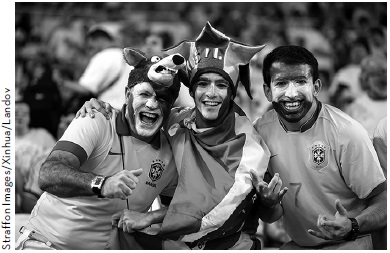
Exuberant Brazilian fans cheer on the Seleo at the Maracan Stadium.
The president of FIFA (international soccers highest authority) at the time of the Cup, Jules Rimet, was so confident that Brazil would emerge as victors from the game that he had already prepared a postmatch speech in Portuguese to congratulate the Seleo players. Plus, the Brazilian Football Confederation had prepared winners medals for each of the Brazilian players.
Next page

